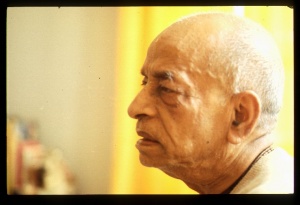SB 3.9.26: Difference between revisions
(Vanibot #0018 edit: make synonym terms in Sanskrit italic in SB - Vanisource) |
(Vanibot #0054 edit - transform synonyms into clickable links, which search similar occurrences) |
||
| Line 24: | Line 24: | ||
<div class="synonyms"> | <div class="synonyms"> | ||
''maitreyaḥ uvāca'' | ''[//vanipedia.org/wiki/Special:VaniSearch?s=maitreyaḥ&tab=syno_o&ds=1 maitreyaḥ] [//vanipedia.org/wiki/Special:VaniSearch?s=uvāca&tab=syno_o&ds=1 uvāca]'' — the great sage Maitreya said; ''[//vanipedia.org/wiki/Special:VaniSearch?s=sva&tab=syno_o&ds=1 sva]-[//vanipedia.org/wiki/Special:VaniSearch?s=sambhavam&tab=syno_o&ds=1 sambhavam]'' — the source of his appearance; ''[//vanipedia.org/wiki/Special:VaniSearch?s=niśāmya&tab=syno_o&ds=1 niśāmya]'' — by seeing; ''[//vanipedia.org/wiki/Special:VaniSearch?s=evam&tab=syno_o&ds=1 evam]'' — thus; ''[//vanipedia.org/wiki/Special:VaniSearch?s=tapaḥ&tab=syno_o&ds=1 tapaḥ]'' — penance; ''[//vanipedia.org/wiki/Special:VaniSearch?s=vidyā&tab=syno_o&ds=1 vidyā]'' — knowledge; ''[//vanipedia.org/wiki/Special:VaniSearch?s=samādhibhiḥ&tab=syno_o&ds=1 samādhibhiḥ]'' — as also by concentration of the mind; ''[//vanipedia.org/wiki/Special:VaniSearch?s=yāvat&tab=syno_o&ds=1 yāvat]'' — as far as possible; ''[//vanipedia.org/wiki/Special:VaniSearch?s=manaḥ&tab=syno_o&ds=1 manaḥ]'' — mind; ''[//vanipedia.org/wiki/Special:VaniSearch?s=vacaḥ&tab=syno_o&ds=1 vacaḥ]'' — words; ''[//vanipedia.org/wiki/Special:VaniSearch?s=stutvā&tab=syno_o&ds=1 stutvā]'' — having prayed; ''[//vanipedia.org/wiki/Special:VaniSearch?s=virarāma&tab=syno_o&ds=1 virarāma]'' — became silent; ''[//vanipedia.org/wiki/Special:VaniSearch?s=saḥ&tab=syno_o&ds=1 saḥ]'' — he (Brahmā); ''[//vanipedia.org/wiki/Special:VaniSearch?s=khinna&tab=syno_o&ds=1 khinna]-[//vanipedia.org/wiki/Special:VaniSearch?s=vat&tab=syno_o&ds=1 vat]'' — as if tired. | ||
</div> | </div> | ||
Latest revision as of 21:15, 18 February 2024

A.C. Bhaktivedanta Swami Prabhupada
TEXT 26
- maitreya uvāca
- sva-sambhavaṁ niśāmyaivaṁ
- tapo-vidyā-samādhibhiḥ
- yāvan mano-vacaḥ stutvā
- virarāma sa khinnavat
SYNONYMS
maitreyaḥ uvāca — the great sage Maitreya said; sva-sambhavam — the source of his appearance; niśāmya — by seeing; evam — thus; tapaḥ — penance; vidyā — knowledge; samādhibhiḥ — as also by concentration of the mind; yāvat — as far as possible; manaḥ — mind; vacaḥ — words; stutvā — having prayed; virarāma — became silent; saḥ — he (Brahmā); khinna-vat — as if tired.
TRANSLATION
The sage Maitreya said: O Vidura, after observing the source of his appearance, namely the Personality of Godhead, Brahmā prayed for His mercy as far as his mind and words would permit him. Thus having prayed, he became silent, as if tired from his activities of penance, knowledge and mental concentration.
PURPORT
Brahmā's enlightenment in knowledge was due to the Lord sitting within his heart. After being created, Brahmā could not ascertain the source of his appearance, but after penance and mental concentration he could see the source of his birth, and thus he became enlightened through his heart. The spiritual master outside and the spiritual master within are both representations of the Lord. Unless one has contact with such bona fide representations, one cannot claim to be a spiritual master. Lord Brahmā had no opportunity to take the help of a spiritual master from outside because at that time Brahmā himself was the only creature in the universe. Therefore, on becoming satisfied by the prayers of Brahmā, the Lord enlightened him about everything from within.